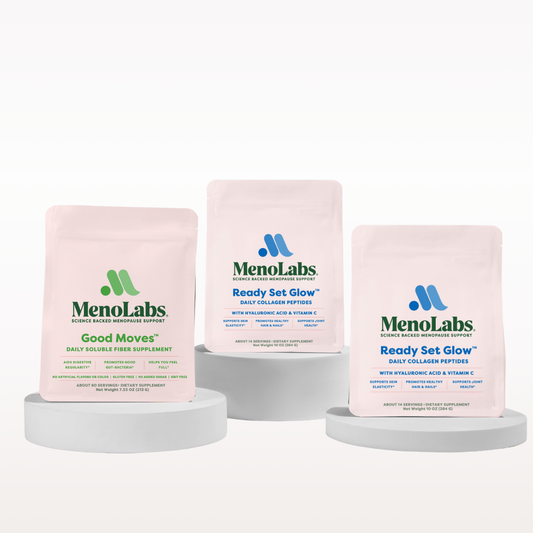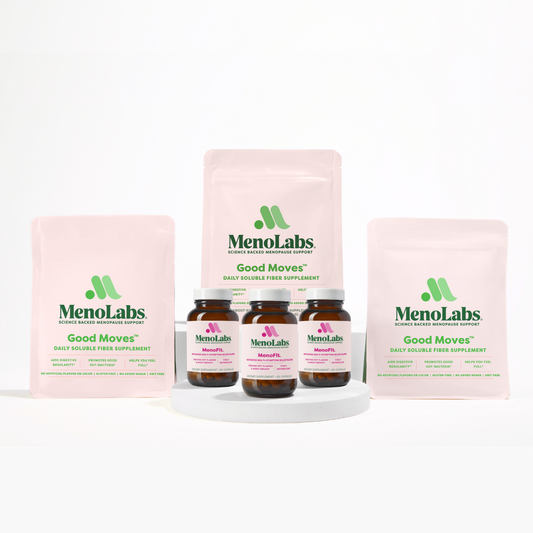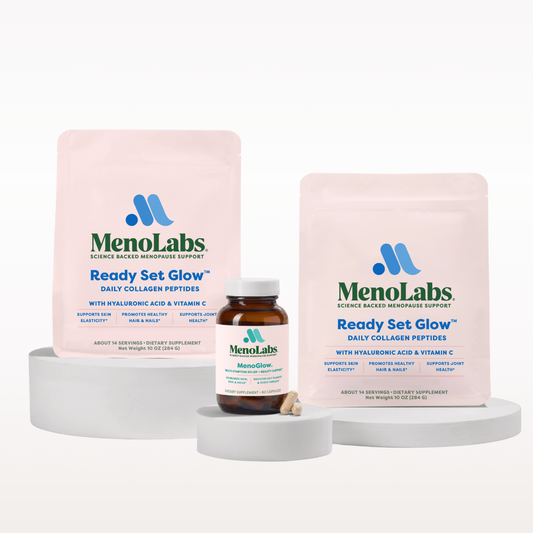Dealing with multiple menopausal symptoms at once can be a challenge. But when those symptoms begin to disrupt your daily routines, like your sleep schedule, it can be twice as difficult. Many women in menopause may be familiar with the horror of hot flashes, but this symptom can also take another form that can interrupt a good night’s sleep – night sweats.
Night sweats are essentially hot flashes that you experience at night, and they can beuncomfortable for multiple reasons. Not only do they raise body temperature and induce sweating, but they can simultaneously cause chills due to the sheer amount of sweat that drenches clothing and bedding. This isn't only inconvenient and unpleasant — night sweats can seriously mess with your sleep.
What Causes Night Sweats?
Night sweats are essentially just hot flashes, so they share the same causes and contributing factors. Hot flashes are triggered by the hypothalamus, the part of the brain responsible for regulating body temperature. When estrogen levels deplete during the start of peri/menopause, the hypothalamus' ability to regulate body temperature decreases slightly. It becomes sensitive to even the slightest changes in temperature, both internally and externally.
It might seem like the cooler air of nighttime temperatures would lessen the intensity or frequency of night sweats, but this isn’t always the case. In fact, most women can still experience hot flashes even during colder weather due to other factors like caffeine, chronic stress, and health conditions like high blood pressure.
Why Night Sweats Increase Insomnia
Night sweats often contribute to insomnia, and it’s not hard to see why. They can not only make it difficult for women to fall asleep but it can also cause women to wake up periodically throughout the night and make it difficult to fall back asleep.
How Can You Combat Night Sweats?
No one wants to wake up to a puddle of sweat in the middle of the night. So what can women do to help combat their night sweats?
Skip the Glass of Wine
Alcohol is a hot flash trigger, and drinking that glass of wine or beer before bed can increase your chances of having night sweats. Alcohol is a vasodilator, which means it widens your blood vessels. This allows blood to flow through your bloodstream at a faster rate. When blood moves quickly through the body, it increases your heart rate. When your heart beats fast, your body temperature rises. This causes your brain to think you're overheating and triggers a hot flash or night sweat. So instead, stick to a cold glass of water.
Avoid Caffeine in the Afternoon
It can take anywhere from three to five hours for the average person to metabolize caffeine, and for women in menopause, it can take even longer. Some women have found that one cup of coffee can fuel them for up to 12 hours, depending on how they personally metabolize caffeine. While many of us may rely on that second cup of coffee to get through the 2:30 slump, that caffeine can stay in your system long enough to throw off your circadian rhythm.
This plays a role in night sweats because caffeine is a vasoconstrictor, meaning it narrows the blood vessels. This can make it more difficult for blood to flow through the body quickly and increases blood pressure. When blood pressure increases, it puts strain on the heart, and the heart beats faster in order to compensate for that pressure. High blood pressure and an increased heart rate lead to a rise in body temperature which triggers hot flashes and night sweats.
So rather than sip on that cup of coffee after 2 o'clock, switch it out for a non-caffeinated tea or try some exercise to help release endorphins to keep yourself energized.
Relieve Stress Before Bed
Stress hormones raise your body temperature, heart rate, blood pressure, and all of these things trigger night sweats.
One of the simplest things you can do to relieve stress is deep breathing exercises before bed. Take half an hour to sit still, with your eyes closed and focus on breathing deeply. Follow along to a breathing exercise video or download an app. Deep breathing helps relax your brain and body by increasing the amount of oxygen that gets circulated to the brain and the muscles and maintains steady body temperature.
Instead of sitting on the couch scrolling through your work emails, try engaging in one of your favorite hobbies. Read a book, paint, sketch, sew, do yoga — whatever brings you joy, and helps you decompress. Engaging in an activity that you enjoy is a great way to relieve stress and increase happiness hormones like serotonin. When these hormones are high, your body and brain can relax more effectively.
Don't Let Night Sweats Defeat You
Your night sweats do not have to dictate your sleep schedule or your quality of sleep. You can fight back against your night sweats by making simple adjustments to your routine. Talk to your doctor about your menopausal symptoms and discuss all the best solutions for night sweats for you that can help you find some relief.
Related Products
Blend Besties Bundle
Fresh Start Bundle
4.7 / 5.0
(554) 554 total reviews












